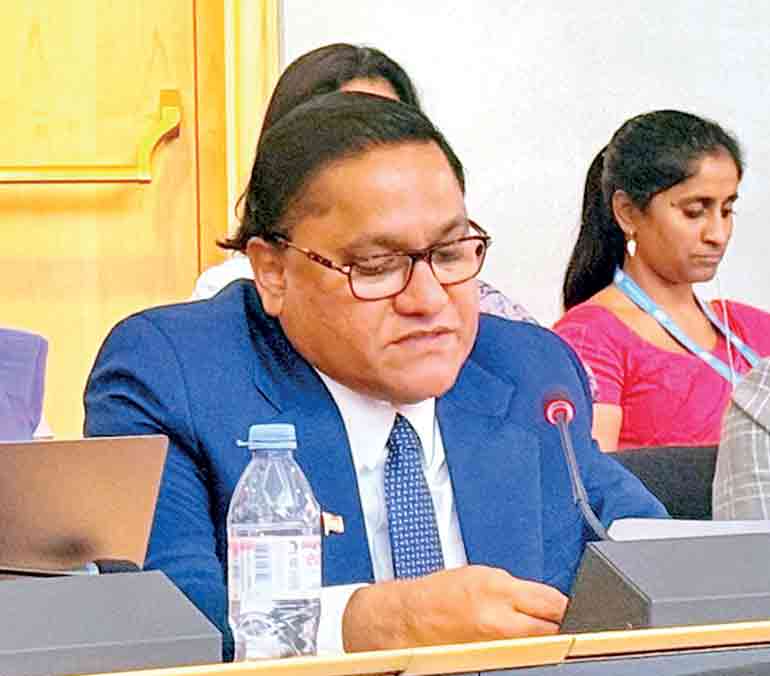Sunday Feb 22, 2026
Sunday Feb 22, 2026
Tuesday, 9 September 2025 02:44 - - {{hitsCtrl.values.hits}}

Foreign Minister Vijitha Herath
Foreign Minister Vijitha Herath yesterday assured the United Nations Human Rights Council (UNHRC) that the Government is committed to reconciliation, human rights, and democratic reforms through national institutions, adopting a conciliatory stance towards international partners even as he firmly defended the country’s sovereignty against external accountability mechanisms.
Speaking at the 60th session in Geneva in response to the report on Sri Lanka presented by UN High Commissioner for Human Rights Volker Türk, Herath said the administration of President Anura Kumara Disanayake had, within a year of taking office, strengthened anti-corruption laws, launched new welfare programs, moved to repeal the Prevention of Terrorism Act (PTA), and resumed investigations into longstanding human rights cases.
He insisted that accountability will be ensured domestically through independent courts and institutions, noting “recent decisions by the Sri Lankan Courts demonstrate the independence of the judiciary.” Herath highlighted steps to establish a Truth and Reconciliation Commission, resource the Office on Missing Persons, guarantee civil society space, and return or compensate land held by the State.
“The Government is opposed to any external mechanism imposed on us, such as the Sri Lanka Accountability Project, which serves to create divisions and complicate the national reconciliation process,” the Foreign Minister said, urging the Council to recognise progress made in less than a year and to provide Sri Lanka the “time and space” to continue reforms.
The full text of Foreign Minister Vijitha Herath’s remarks to the UNHRC is as follows.
One year ago, the people of Sri Lanka voted with one voice, to bring about a transformation and usher in a new political culture. Our democratic traditions have been upheld through timely elections held in a free, fair and peaceful manner.
A number of measures have been introduced to promote the economic and social wellbeing of the people, to strengthen reconciliation and ensure social justice.
The Government has provided comments on the High Commissioner’s Report and I wish to address some of the matters raised in it:
The Attorney General would prefer indictments only if there is a prima facie case against an accused, and as such the negative portrayal of the AG’s Office in the Report does not stand to reason. The prosecutorial discretion of the Attorney General is not an unfettered power and is subject to the full force of judicial review.
The reference to the amended Personal Data Protection Act in the Report is erroneous as the proposed revisions are not related to exemptions as indicated:
Sri Lanka has continued to engage constructively with this Council, OHCHR as well as with the regular human rights mechanisms. Developments within less than a year clearly demonstrate our genuine commitment and determination to protect and promote the rights and wellbeing of all Sri Lankans through our domestic processes.
Therefore the Government is opposed to any external mechanism imposed on us such as the Sri Lanka Accountability Project which serves to create divisions and complicate the national reconciliation process underway in Sri Lanka.
We are committed to working towards a country that respects and celebrates the diversity of its people in line with our domestic legal framework. The Government will continue to work in close cooperation with the international community through capacity building and technical assistance in mutually agreed areas to further strengthen these efforts.
We urge this Council to take note of the progress made within a short period. We seek your continued support to provide us the time and space that is required to make use of this historic opportunity to advance the rights and wellbeing of all Sri Lankans through national processes.